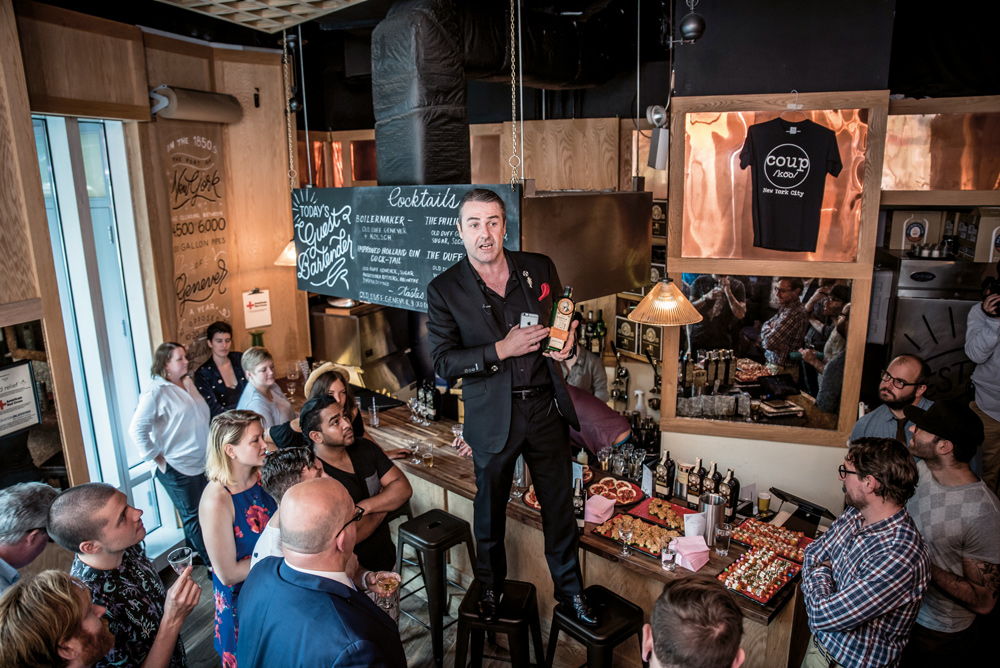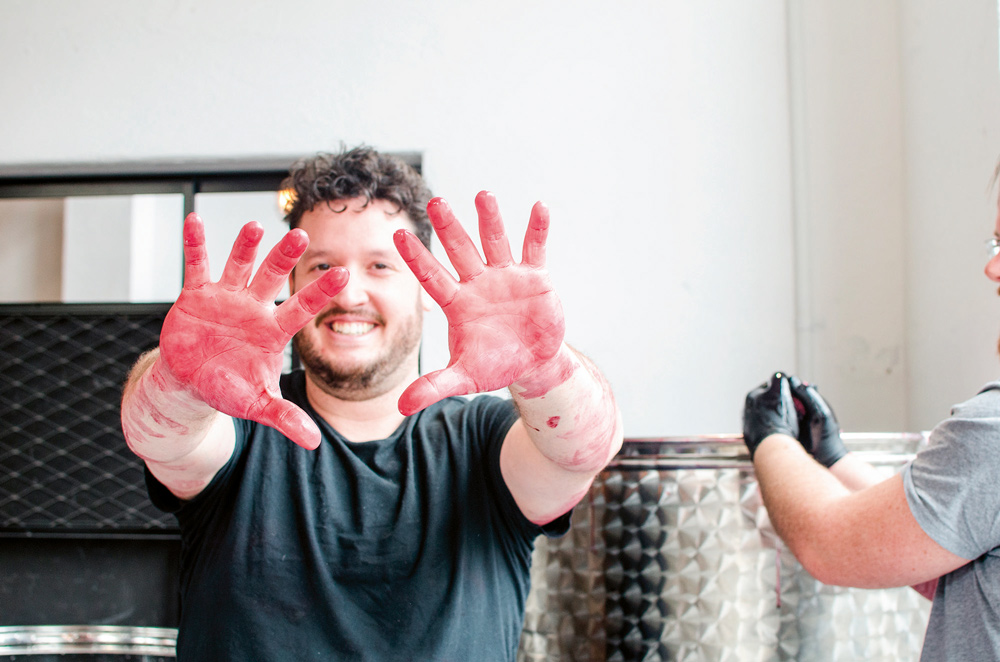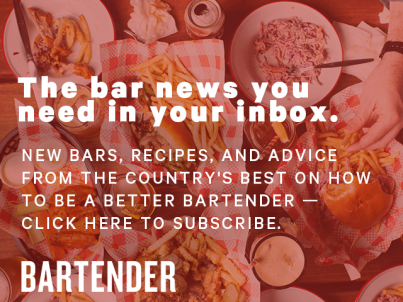
Whereas once bartending was treated as more of a means of getting through uni — or until you scored that ‘real job’ — nowadays bartenders are looking at how they can extend their careers for another 10, 20, or 30 years. What’s one of those ways? Create your own liquor brand.
Even just 10 years ago, the thought that a bartender would go on to create their own booze brand was something that didn’t make a lot of sense. Were you going to go up against the big boy vodka producers of the day? The idea was ludicrous.
But it’s an idea that’s not so far out of the realms of possibility today, and it’s what New York-based spirits educator, bar owner and bartender Philip Duff has just done.
“What the whole project is really about is, if you’re a bartender, can you do it on your own?” he says.
“We all know you can open a bar on your own, but if you’re a little player can you use that size to your advantage? It’s like judo, commercial judo.”
The rise of small, independent craft spirits over the last decade has shown that there is an appetite and demand for spirits from the public and bartenders alike. And with bartenders now reaffirming their credentials as arbiters of good drinking taste, making the leap from bartender to brand owner is more feasible than it’s ever been.
After all, you’ve been bottling cocktails in house, designing up labels for them, and promoting your wares to the public on social media. Why not take the next step and make your own booze?
Why are you getting into it in the first place?
Shaun Byrne is someone who has done just that, first launching the Australian vermouth brand Maidenii back in 2012 and now, with Nick Tesar, Lauren Bonkowski, and Hugh Leech, has just launched Marionette.
“In the first instance with Maidenii it was born out of a mutual passion of vermouth that I shared with my business partner Gilles [Lapalus],” Byrne says.
“In the beginning we didn’t have any real direction, we just knew we loved what we were doing however with Marionette, it was a little different. I had been working with Lauren (Maidenii designer), Nick (Gin Palace, Lume, Bar Liberty) and Hugh (Gin Palace, Melbourne Gin Company) for years, we are all mates and we wanted to work on a project together.”
But the project didn’t take off until they realised there was an opening to hero Australia’s great quality fruit in quality cocktail liqueurs.
“We saw an opportunity to utilise the local and international distributional channels we had with Maidenii to push new products through,” he says.
“But most importantly we saw an opportunity in the liqueur space in Australia, working directly with farmers to reproduce cocktail staples.”
For Duff, there were two reasons why he wanted to create his own brand.
“One is, I love Holland. I lived there for 17 years, had a Dutch wife, speak the language, started two businesses —I’m totally into it,” he says. “All the Dutch genever that’s sold as Dutch is not actually distilled in Holland; they buy liquid in from Belgium. It’s great liquid, and it’s genever that is supposed to be from Holland — it tastes great, but it’s not from Holland. That’s one thing.
“The other thing is, my business is really being a bartender for brands. Just like a bartender — you steer them in the right direction, you make sure they don’t hang around with the wrong people, make sure they don’t get drunk on power or money, and you try to help them have their best day. You come with ideas, you’re creative, but what better way to up my game than creating a brand? So I’ve created the brand, it’s distilled in Europe, it’s sold in New York, we’ve created two labels, two liquids, and I thought I knew everything there is to know about this but I have to tell you the last year has been a vertical learning curve.”
What’s the takeaway here? Know why you’re getting into the game — note, neither Byrne nor Duff said they were in it to make a fortune — and focus in on your booze passions.

Think about what you choose to make, and why
Duff shared one particular piece of great advice when it comes to what you choose to launch. Why did he choose genever, and not, say, vodka?
“First of all, no-one can compete with Smirnoff, right?” he says. “It’s like, someone asked the owner of the Coyote Ugly Saloon why did she call it Coyote Ugly? She said: because Cheers is already fucking taken. With genever, very commercially, there’s no competition, there’s low expectations — you could be the best selling genever in America if you only sold 2000 cases. That’s all it takes.”
And again, passion for the product is a big part of the decision.
“I’ve done a lot of research on genever and I’m privileged that I’ve been able to publish it, and it’s changed the way people educate themselves about gin and genever — we’ve now got history that goes back to 1269, 1497, that I’ve been able to translate, so I know it,” he says.
Duff says that you should seek out the inefficiencies, and build a brand in a space that is under-served.
“Find the inefficiency,” he says. “So, bars start up in areas where rents are low, you build a great bar and people come to the area. That’s an inefficiency. In the drinks business, find the inefficiency — like Alex Kammerling basically created an English Campari. No-one can catch him now, he’s too far ahead. You could create an Australian Chartreuse, why not? It doesn’t matter, to quote Seth Godin, how small you are — no niche is too small if you own it. I firmly believe that I can build a sustainable business with geneveer. If you want to go up against Absolut, fill your boots, there’s great opportunities there, but I feel there’s less stress and hair loss.”
How long does it take? It’s not an overnight thing
You’re busy, we’re busy, everyone these days is busy, busy, busy, right? And we assume that you’re not going to think that launching your own booze brand will be a simple, quick endeavour, but then again, it needn’t be something that takes you the better part of a decade to come out with. After all, if you dillydally, you might miss your opportunity to cash in on that unicorn tears akvavit you’ve been raging on about.
“Realistically, from when I started kicking arse, [it took] three years,” says Duff. He says that he had to make the project a priority though, so that it wasn’t put off to the never-never. “And last year, it should have launched and we missed the ship date. And I said, right, hell or high water, this is launching in 2017. You’ve got to get serious with yourself, you’ve got to make it a priority. I’m a self-employed consultant, so I had to put myself near the top of the list, and that’s tough.”
For Byrne, the Maidenii brand took about one year to get to market.
“Marionette we only launched in October, but that was at least a year in the works also,” he says.
Have a strategy for getting the word out
For Marionette, their design will do a lot of heavy lifting in terms of getting noticed — take a look at their social media pages and you can see the design behind the brand is built for the Instagram age.
“The fact of the matter is I am lucky enough to work with a design genius in Lauren. Lauren (who has also worked with the likes of Pirate Life and Starward) is able to take my verbal thoughts and turn them in visual delights. Design is so important to a brand and having someone that you can work well with and understands the market is a necessity in my mind.”
Duff, on the other hand, is taking advantage of his own social media following and the fact that where he lives, in New York, is drinks culture central.
“I live in New York, it’s convenient for me,” he says. “All the drinks writers are there, all the influencers, a lot of the hot bars — our first ever order was from the Nomad Hotel, for a case of each, and the third order was from Eleven Madison Park, so that’s great. We won’t launch country by country or state by state, it’s city by city. So I’ve said from the start, New York, London, and then either Rome or Sydney. And then we see, maybe Berlin, San Francisco.”
The fact that he’s got 5,000 Facebook mates, over 7,000 Twitter followers, and 4,000 on Instagram, can’t hurt either.
Knowing the right people and evangelising your brand is the cheapest way to get your product in front of the people who matter, and it’s key to Byrne’s strategy, too.
“Networking, networking, networking in a nutshell,” he says, as well as working with distributors who “really help push the brand in the places we can’t directly reach.”


This is a great story. I’m in the United States and I am founded LeSin Vodka and Blue Lava Tequila. I’ve actually helped a few bartenders and bar owners create their own brands. If anyone wants to see any US sourced info, they can check out my personal content at http://www.40-80spirits.com. Or search Liquor CEO on YouTube.
It’s a very regulated industry here in the US, so be prepared for a LOT of government stuff.
I also have a lot of marketing, activation, and formulation info out there too.
Great Article. Thank you for publishing this.
Charles
How about doing a strong drink named AUSRI for the Sri Lankan community in Australia and New Zealand.I am sure it will sell a lot
Your thoughts,
A veteran of 45 years on the trade.